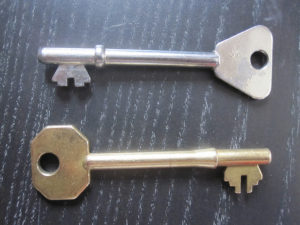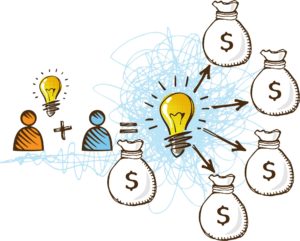 Working from home is something many of us wish we could do. It gives you control and freedom over your schedule and workload. As well as increasing the time you spend with your family by removing long commutes to and from work. But many people overlook their security and how it can effect their new business venture. Regardless of what type of business you are running, not having a secure home office can be dangerous. A burglar can easily gain access not only to your business equipment but to the rest of your home too. So to reduce the risk of this happening, use these simple ways to start boosting your security.
Working from home is something many of us wish we could do. It gives you control and freedom over your schedule and workload. As well as increasing the time you spend with your family by removing long commutes to and from work. But many people overlook their security and how it can effect their new business venture. Regardless of what type of business you are running, not having a secure home office can be dangerous. A burglar can easily gain access not only to your business equipment but to the rest of your home too. So to reduce the risk of this happening, use these simple ways to start boosting your security.
Install computer security
Burglars are not the only threat to your home business. Hackers, identity thieves and cyber criminals could also target your business. The tablet, laptop or computer you use for your business most likely has plenty of vital information on it that assists you in your daily task. These can include customer details and bank records. If hackers got hold of this information, they could quickly steal from you and ruin your business. So it’s essential that you install computer security such as anti-virus, firewalls, and anti-spam. Passwords are also something you should regularly be using. Keep this software regularly up to date to ensure your business records and files are protected.
Check your office windows and doors
Whether your office is upstairs or downstairs, checking the windows and doors is an integral first step. Firstly, you need to check the locks are fully operable. If they aren’t, you need to have them replaced or repaired by a professional. Deadbolt locks are a popular choice as they are difficult to break into. Check the frames both inside and out to make sure they cannot be pulled off or tampered with. These too will need to be repaired or replaced if not up to scratch. You can also add security screen doors and windows to your home office. These will act as a deterrent to thieves while also allowing plenty of sunlight to enter the space.
Keep your keys and codes hidden
If you leave keys in a door or have your safe code on display, thieves will be more tempted to break in. As horrible as it is to believe, even people you know and invite into your home can take advantage of this. So always keep all keys to your home and home office out of view and preferably locked away somewhere safe. Choose codes that have sentimental value for alarm systems, safes and briefcases. This will make them more memorable, just try not to make them too obvious. It may be inconvenient to have to do this, but it with improve your security no end.
Now you know what you have to do, make the effort to get your security up to a high standard. As well as protecting your home, they can also protect your livelihood. So don’t tempt burglars in and implement these security boosting techniques as soon as possible.
 If you are not able to keep your new business’s finances under control, then things can spiral pretty quickly. Businesses only succeed when they are financially secure, so here’s how to keep your money issues in order.
If you are not able to keep your new business’s finances under control, then things can spiral pretty quickly. Businesses only succeed when they are financially secure, so here’s how to keep your money issues in order.
Budget
Budgeting is something that every business should do. If you are not budgeting for the year ahead, then you will face problems later on down the line. A strong budget will outline how much money you aim to bring into the company through revenue streams. And it will also outline how much you plan to spend. Then you obviously need to make sure that you make more money than you spend. Otherwise, you’ll make a loss, and that’s clearly not what you want. You can take advantage of loans and maximize loan budget in order to stretch your cash a little further if you really need to. This should all be prepared and planned out in advance though.
Organize Tax Documents from the Start
Nobody particularly enjoys paying taxes, but it has to be done. And failing to pay your business’s taxes is a criminal offence, so it’s not something that you can afford to ignore. Making sure that you pay the right amount of tax and meet all the relevant deadlines can be a challenge though. If you are not properly organized, then the whole task becomes so much harder than it really needs to be. So, you need to make sure that all your payroll documents, tax deductible expenses and other paperwork are kept in order. Then, when it comes to filling in your tax return, your life will be so much easier.
Consider Seasonal Cash Flow
Many businesses will see variable sales rates over the course of the year. This is pretty obvious for some companies. For example, a company that sells sunglasses will sell more in the summer than the winter. This is just common sense. But there can also be season cash flow variations for businesses operating in less obvious sectors too. You need to get to grips with your company’s sales cycles as quickly as possible. Once you know when your sales are at their highest and when they dip, you can organize your finances accordingly. If you don’t, you could be caught short when those sales dip.
Always Ask for Discounts
The amount of money you spend is one of the key financial considerations for your business. If you are spending more money than you need to be, that extra money will eat into your finances. Whereas, if you were to cut the amount of money that your business spent, there would be less pressure on your sales efforts. You can afford those sales dips if you are keeping your monthly expenditure as low as it possibly can be. One of the things that you should always do is ask for discounts. If you have suppliers that you are buying from in bulk, then you should be able to get some for of discount from them. This will certainly be possible if you can show them loyalty.
Tags: budgeting, business, capital, economy, financial planning, loans, money, tax
 Budgeting, Business, Financial Planning, Money, Tax
Budgeting, Business, Financial Planning, Money, Tax
 There is no point in leaving all your cash in your current account. The interest rate will only be fairly low. It is much more advisable to move your money into a better investment that can help it increase. Of course, leave some money in your current account for everyday needs. But all your savings? It’s better off to invest them. If you are a complete novice when it comes to investing, it can be a very daunting prospect as there is a slight risk that you could lose some money. Here is what you need to know before you start.
There is no point in leaving all your cash in your current account. The interest rate will only be fairly low. It is much more advisable to move your money into a better investment that can help it increase. Of course, leave some money in your current account for everyday needs. But all your savings? It’s better off to invest them. If you are a complete novice when it comes to investing, it can be a very daunting prospect as there is a slight risk that you could lose some money. Here is what you need to know before you start.
Diversify
One of the big things to remember is the importance of diversifying. This helps you reduce the risks of investing. What does diversifying mean? Simply put, it is when you split up your money and invest in different methods. This is a much safer alternative than placing all your cash in just the one investment. Diversifying reduces the risks of investment. Because you are essentially spreading your eggs across different baskets.
Stocks And Shares
One of the most common ways to invest your money is in stocks and shares. This involves buying some stocks and shares of a company that is floating in the stock market. You will be able to buy as many as you like, although some companies have a minimum purchase limit. Before you commit to buying a company’s shares, you need to do your research. If the company is currently doing well, then there is a good chance the value of your shares will increase, leaving you with a profit. However, if the value falls, you could end up out of pocket. If you do your homework, you can make a lot of money over a long period of time!
Funds
Instead of investing directly in stocks and shares yourself, you can put your money into mutual funds. This is, basically, where you get a professional to invest your money for you. You transfer the money you want to invest to this financial advisor who then places it into a fund, so he can keep an eye on your money on a daily basis. This is known as a mutual fund, and your advisor is now the fund manager. There are a few different types of funds available. For self managed super fund advice, check online.
Savings Account
One of the safest ways to invest money is to place it in a high-interest savings account. There is no risk involved with a savings account, as the amount of money held in there won’t change depending on the economy. It is an easy way to get more money, though. The more money you have in the account, and the higher rate of interest, means you can get a substantial payment from your bank each month.
So, to be clever with your money, sometimes you have to take a risk and invest. If you do your research, you’ll find the benefits far outweigh any potential risks!
 Debts are an unfortunate part of life. Unless you come from a particularly rich family and have all the luck in the world, you’re going to have to deal with debts at some point. It might be loans for education, your home or your business. It might be because of credit cards that we’ve lost track of. Or perhaps overdrafts that we dug into a little too far. How much you dug into debt doesn’t matter all that much. What does is taking control and getting back out of it. Below, we take a look at how exactly that might happen. Whether it’s managing or getting your debt forgiven altogether. Or whether it’s rolling up your sleeves and organising your finances like you’ve never organised before.
Debts are an unfortunate part of life. Unless you come from a particularly rich family and have all the luck in the world, you’re going to have to deal with debts at some point. It might be loans for education, your home or your business. It might be because of credit cards that we’ve lost track of. Or perhaps overdrafts that we dug into a little too far. How much you dug into debt doesn’t matter all that much. What does is taking control and getting back out of it. Below, we take a look at how exactly that might happen. Whether it’s managing or getting your debt forgiven altogether. Or whether it’s rolling up your sleeves and organising your finances like you’ve never organised before.
Student loan
The biggest loan that most of us will carry on our backs is a student loan. Even if you’re not in trouble with your payments, it can weigh heavily over you. How do you take care of it? Do you save to get rid of it now in place of your retirement fund? Do you stick to having it cut out of your wages for years to come? Paying off your student loan can negatively affect your credit rating but that will repair in time. Freeing yourself from it early can let you save for the rest of your life a lot more consistently. Public service loan forgiveness is also available, helping some in getting their student loan shaken off.
Better organisation
The key to paying off their debts quicker for most people means putting a lot more money aside for it. This takes the skill set of managing more money on the side without seeing how much you’re actually putting together. The right usage of online resources can help you manage your finances with all the more precision and mindfulness. For example, online banking allows you to track your spending in real time. That way, you know whether or not you’ve gone over your budget every time you take money from the bank. Similarly, using Google Sheets or Microsoft Excel can help you turn all your earnings and outgoings into an easily tracked sheet. With the right forward planning, you might find yourself shaving off a lot to put towards repaying your debts.
Debt consolidation
Consolidation is a bit of a wary subject for a lot of people. Many don’t really understand how it works and whether or not it will actually benefit them. It’s an important question to ask before jumping at it. Consolidation can, indeed, be the exact wrong move in situations. If you’re worried about multiple credit card debts for example, you won’t want to consolidate. Debt consolidation companies and banks don’t have the upper limit on their interest that credit cards do. However, with other debts, it can be an easy way of making it more manageable if it’s reduced to just owing one company money. Check the interest rates carefully before you agree to anything, however.
 Are you thinking of taking out a payday loan? They have a certain reputation, but is it fair? Here are the main pros and cons of this type of loan that you should know about before you take one out.
Are you thinking of taking out a payday loan? They have a certain reputation, but is it fair? Here are the main pros and cons of this type of loan that you should know about before you take one out.
Pros
Quick Cash
Once your loan application has been approved by the lender, it usually doesn’t take long at all to get the money. They will usually send it within 24 hours, and that’s something you won’t get from many other lenders. The speed of the process is something that lenders like Personal Money Store emphasize most. Many people need money very quickly when they apply for a payday loan. So, the quicker this takes place, the better. No other form of lender can compete with payday lenders in this regard.
Easy Applications
There is nothing complicated about the application process when you borrow from a payday lender. All you have to do is let the company know how much you would like to borrow. They will then tell you what the repayment term will be and what the interest rate is. Contrast this with other forms of borrowing money. When you want to take out a bank loan, for example, you have to take the time out to organize a meeting with them. And the whole process can take a long time.
You Are in Control
You are in complete control of how much you borrow when you take out a payday loan. You can borrow a very small amount of money, which is not usually possible when you borrow from other lenders. And you can also borrow larger amounts when you need to. Many payday lenders will allow you to borrow more in the future once you have proven that you can pay back what you borrow. This level of choice and control is something that persuades many people to use this option.
Cons
High Interest Rates
As long as you know what you’re getting yourself into, this might not be much of a problem for you. But the fact is that payday loans have to charge higher interest rates. That’s how they can afford to do all the positive things outlined above. For many people, this is a worthwhile compromise. But others, it might be too much for them to handle when it comes to repaying the money eventually. It’s important to understand exactly how much you’ll pay back in the future before borrowing.
Some Additional Fees
There are also often additional fees that you will need to pay. You should enquire about this before you borrow the money. It’s always best to know exactly what you are signing up for. It might only be outlined in the small print, and a lot of people don’t even bother to read that. There are also late fees that will start to stack up if you begin to miss your repayment deadlines. It’s important that you don’t miss those deadlines because each missed deadline will make it more expensive for you.
Tags: budgeting, credits, debts, economy, interest rates, loans, money, payday loan
 Credits, Debts, Financial Planning, Loan, Money
Credits, Debts, Financial Planning, Loan, Money
 Working from home is something many of us wish we could do. It gives you control and freedom over your schedule and workload. As well as increasing the time you spend with your family by removing long commutes to and from work. But many people overlook their security and how it can effect their new business venture. Regardless of what type of business you are running, not having a secure home office can be dangerous. A burglar can easily gain access not only to your business equipment but to the rest of your home too. So to reduce the risk of this happening, use these simple ways to start boosting your security.
Working from home is something many of us wish we could do. It gives you control and freedom over your schedule and workload. As well as increasing the time you spend with your family by removing long commutes to and from work. But many people overlook their security and how it can effect their new business venture. Regardless of what type of business you are running, not having a secure home office can be dangerous. A burglar can easily gain access not only to your business equipment but to the rest of your home too. So to reduce the risk of this happening, use these simple ways to start boosting your security.















